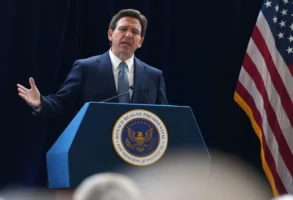
Published October 11, 2021
Two big developments indicate that zoning may be on the cusp of emerging as a high-profile political issue. This is in direct response to growing moves by Democrats at the federal and state levels to kill off single-family zoning. Control over zoning is a core function of local government, which means that federal and state efforts to choke off local control are direct assaults on our federalist system.
The first indication of zoning’s possible emergence as a top-tier political issue is a hard-hitting new ad by the conservative Frontiers of Freedom Foundation. The ad highlights Virginia Democratic gubernatorial candidate Terry McAuliffe’s support for President Biden’s plans to undercut single-family zoning. The ad informs voters that attacks on local control of zoning can come from states as well.
Although it has not been widely reported, after a series of bitter legislative battles, the California legislature recently abolished single-family zoning — over considerable opposition from Democrats as well as Republicans, including many minorities. The anti-McAuliffe attack ad pointedly reminds Virginia voters of the news from California.
California, in turn, is the source of the second major political development. Although the story of SB 9, California’s statewide ban on single-family zoning, has had only limited national play to date, there is a move afoot to put a measure on the 2022 California ballot that would effectively nullify SB 9 by restoring local control over zoning. Although signature collection has not yet begun, it is relatively easy to secure a statewide referendum in California, especially on a high-profile issue like this.
California ballot measures draw national attention. A referendum on local control over zoning in the nation’s largest state would dramatically raise the profile of this issue. In conjunction with the Biden administration’s revival of Obama’s radical Affirmatively Furthering Fair Housing (AFFH) regulation, and additional congressional efforts to kill off single-family zoning (possibly in the big infrastructure bill, if we ever find out what’s in it), a California referendum could rocket this issue to national prominence. And if McAuliffe goes down after an ad campaign focused on the zoning issue, it will serve as a roadmap for Republicans in other states.
For years, the zoning as a national political issue has been more a matter of theory than practice. I wrote about Obama’s plans to do away with single-family zoning well before AFFH had even been issued. At the time, the left denied that any such plan was in the works. Then Obama put AFFH in place, but so close to the end of his second term that he had to depend on a prospective President Hillary Clinton to enforce it. Instead, President Trump suspended AFFH and eventually killed it. With Biden in the process of reviving AFFH, and the infrastructure bill in limbo, active enforcement of federal laws designed to kill off single-family zoning is not quite yet a reality.
Yet the emergence of state-level single-family zoning bans, in conjunction with major federal efforts along the same lines, may be about to kick this issue into high gear. Democrats have always worried that their plans to do away with single-family zoning will be politically unpopular, even with many Democrats. They haven’t yet had to face the political consequences of their own policies, however. With local control over zoning now injected into the Virginia governor’s race, and a California referendum very likely on the way, that may be about to change.
Stanley Kurtz is a senior fellow at the Ethics and Public Policy Center.
Stanley Kurtz is a Senior Fellow at the Ethics and Public Policy Center. Beyond his work with Education and American Ideals, Mr. Kurtz is a key contributor to American public debates on a wide range of issues from K–12 and higher education reform, to the challenges of democratization abroad, to urban-suburban policies, to the shaping of the American left’s agenda. Mr. Kurtz has written on these and other issues for various journals, particularly National Review Online (where he is a contributing editor).




